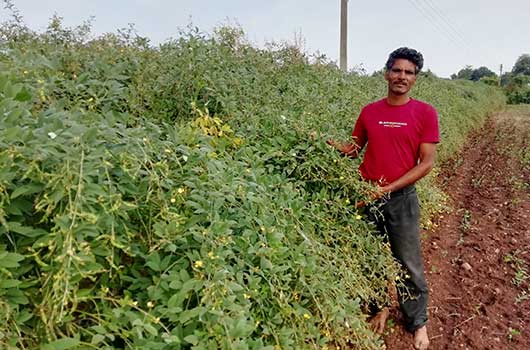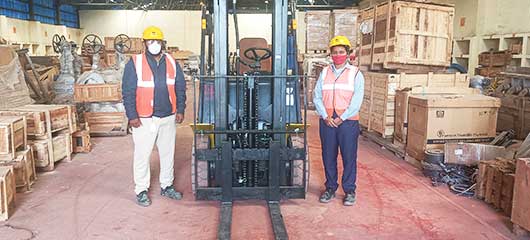Agriculture and its allied activities have always been the backbone of India and its economy. However, as the population surges upward more and more stress is being put on increasing agricultural production. But because land is a limited resource, either land productivity needs to be increased or people in rural areas need to be educated and trained in alternative sources of employment and income generation. Through various interventions, TCSRD aims to provide farmers with the training and knowledge they need to make their farms more productive and profitable, while also helping people in rural areas develop the skills they need for gainful employment.
| Farm-based livelihood (Unnati) | Non-Farm based livelihood |
|---|---|
| Agriculture Interventions | Skill Training programme (Badte Kadam) |
| Livestock Management | Cluster & Rural Enterprise Development |
| Centre for Sustainable Agriculture & Farm Excellence (C-SAFE) | Okhai Centre for Empowerment |

Name of Intervention: C-SAFE -Pulses Project
Name of Beneficiary: Pravin Kolte
Location: Selapur village, Motala taluka, Buldhana district, Maharashtra
I had been trying to get better yields for my crops for long, but with barely any progress. After enrolling in the C-SAFE Pulse Project, I received periodic guidance on better and more scientific cultivation practices. C-SAFE advisors called us and sent SMS-es with tips on new techniques every week, and sometimes more frequently depending on weather conditions. I could also reach out to other farmers and C-SAFE crop advisors nearby when needed, through group calls. By implementing their innovative methods, I was able to save Rs 2,200 per acre in cultivation costs for Tur dal. This also helped me get an additional market realisation of Rs 1,050 per acre, thanks to FPO procurement.
Name of Intervention: Skill Development-Trade: Forklift Training
Name of Beneficiary: Chavda Chandrika Pareshbhai
Location: Arambhada villag, Devbhoomi Dwarka district, Gujarat
I always dreamt of establishing my own successful enterprise. When I learned about the SAKSHAM - Forklift training during an awareness programme conducted by the Technical Training Institute (TTI) staff, I decided to take up this opportunity.
I chose the Forklift Operation course even though it is physically demanding and did not let my being a woman come in the way of my dream. The 45-day training conducted at TCSRD's TTI in Mithapur also helped me improve my interpersonal skills through the soft skills and computer literacy training that was given in addition to the technical training.
After completing training and receiving my license, I signed a contract with TCL as a forklift operator with a supply rate of Rs 1,100 for eight hours of supply per day. For this, I invested around Rs 50,000 and took a loan for the remaining amount. Taking the first steps in my entrepreneurial journey was a leap of faith, and I am now happy to have listened to my heart.
